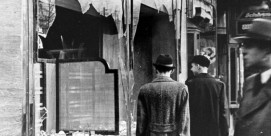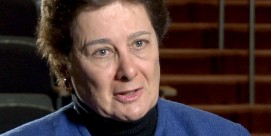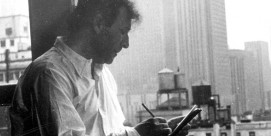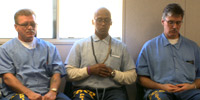CHARLES MARSH (Author, “Strange Glory: A Life of Dietrich Bonhoeffer”): Bonhoeffer was a precocious young man and he had his first doctoral dissertation under his belt by the age of 21. By the age of 24 he had completed his second doctorate.
From an early age his intellectual and even his theological curiosities were indulged and nurtured in a home where ideas and music and innovation and indeed, great privilege abounded.
But he took a trip to the United States in 1930, ‘31 that really compelled him to rethink the understanding of the theological vocation. When he arrived in New York he was invited to come and be a visiting student at Union Theological Seminary, and when he arrived he was a straight arrow academic with his sights set on, you know, academic fame and fortune in the German milieu. He came to the US because it seemed like another fascinating chapter in his very charmed life so far.
He said he had heard the gospel preached for the first time in the Church of the outcasts of America, by which he meant in the African American church in Harlem and in small rural black churches he seems to have attended. He imagined a new way of thinking about Jesus in the Abyssinian Baptist Church in Harlem. He had never seen professors as he saw in New York who took their students out of the classroom into the cities to work in faith-based organizations, in ACLU and tenement housing projects and homeless shelters and the like or who took them to help do labor organizing in the deep south.
And it really appears that this conversion was deep and far-reaching in the United States and that when he came back, he had his sights set on a very different way of thinking about how to be a theologian, how to be a pastor, and what it means to be a Christian.
He brings liberals and Evangelicals together. He brings Catholics and Protestants, Jews and Christians, believer and nonbeliever in, you know, shared admiration of an indisputably authentic witness. After 1931, ’32 he was writing theology out of the Church, out of particular situations of struggle, of doubt, of crisis, and so there’s a freshness, there’s an aliveness, there is a kind of directness.
This is theology that says, I’m a theologian, let’s open up scripture, let’s open up the text of Christian tradition and let’s act as if God is speaking to us in our situation right now. Theologians needed to speak concretely, and so Bonhoeffer almost, you know, in a manner that was almost unprecedented among the German Protestant theologians, began by 1936 and ’37 to talk about the theological mandate of disobedience, of an unjust regime.
And around that time, 1939, 1940, Bonhoeffer began to have conversations with his brother and his brother-in-law, his brother Klaus Bonhoeffer, his brother-in-law Hans von Dohnanyi about moving into a different kind of protest against Hitler. No longer through ecclesial reform, an ecclesial protest, but now through political conspiracy. And it was in those years that he began to turn directly as Eberhard Bethge once said, to the lure of the political, and it changed him as a pastor and as a theologian.
How did this pastor, who was a pacifist, in 1933, ’34, become a pastor who in 1939 was saying it is necessary to kill the madman Hitler?
Bonhoeffer did not think when he accepted his brother and brother-in-law’s invitation to join the conspiracy that he had reached a point where he no longer believed that Jesus meant pacifism, that discipleship was inextricably bound to a certain kind of preference towards nonviolent action.
But he weighed what seemed to him this principled theological pacifism against the responsibility to act decisively and concretely in a way that would bring this evil regime to an end. And so there is a kind of Lutheran “sin and sin boldly“ in his decision to take part in a conspiracy. Bonhoeffer was never a part of the nuts and bolts of putting together explosives or of the logistics of a particular operation to assassinate Hitler, but he was a pastor in the conspiracy and he did pray with the conspirators and he conferred blessings the various coup attempts.
He was arrested in 1943. There is a somberness, there is a kind of gravity as he begins to realize that barring liberation of the camps and the prisons by the Allies or some unexpected event, he will likely be executed.
His death as we now know was not quick and painless but it was very likely drawn out and tortuous. But Bonhoeffer knew that the end of life was for him not the end of all things. It was a beginning, it was a kind of a new beginning for him. And this prelude to eternity for him was I think not simply an individual kind of affirmation of the divine yes and amen, resounding amidst the chaos and ruins and rubble and devastation of Germany, but for Bonhoeffer it was an expression of God’s yes and amen that resounds above all human negativity, all nothingness that ultimately fills in the abyss with the sound of the angels’ joyful singing.






